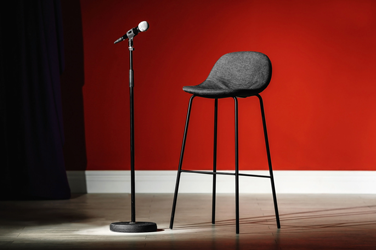Charlie Chaplin is quoted as having said, “To truly laugh, you must be able to take your pain and play with it.” It’s no secret that laughing is known to improve the quality of our lives, and if there’s one thing the world needs, it’s laughter. Comedy is a huge industry that thrives on people searching for some harmless, lighthearted entertainment. The best comedians make it seem effortless, but so much work goes into creating a funny set, and language plays a crucial role in successful comedy. Troy Stark and Monica Hamburg are two talented Montréal stand‑up comedians who have agreed to answer a few questions on the art of comedy.
Question: Would you be willing to try stand-up comedy in a language other than English?
Answer: Performing is generally done in one’s native tongue. While many comedians are bilingual, few are able to perform successfully in more than one language. Troy performs mainly in English but has also dabbled in French and Spanish, basically translating his work into those languages. This, he claims, is no easy feat: “Before I do either again, I would want to be fully fluent in those languages so that I could engage with the subtleties [of each language] better.” Monica would like to perform in French but wants to become more comfortable in the language, adding, “I’d like to challenge myself. It’d be an interesting and terrifying experiment.”
Question: Which language techniques or “go‑to” phrases do you find you use most when performing?
Answer: Language or literary techniques are critical tools for every comedian. Most use imagery without even realizing it. The finest comedians are great at painting relatable pictures with their words so that the audience truly feels drawn in to and immersed in whatever joke they are delivering. Monica starts many of her jokes with the phrase “I like to imagine….” She also seamlessly incorporates alliteration, metaphors, dialogue, and hyperbole into her act.
Troy relies primarily on personal anecdotes, allusion, and repetition: “I like to write one-liners. I like to tell real stories that actually happened in my life. I like to write philosophical essays and try to figure out how to make the ideas palatable for the people who have to hear them. In each joke, you’re trying to get across an idea or an event. Each joke is different. Each joke evolves, based on your self-editing and the reactions you get from varied crowds, as you tell it over and over.”
Question: What would you say is more important in stand‑up comedy: the language or the delivery?
Answer: There is obviously a strong relationship between language and delivery. Troy believes they are both important: “There are lots of comics I think of as ‘writers’ who have obviously spent hours planning what they’ll say on stage and expect the words alone to blow people away. There are probably more ‘performers’ who think they can go on stage and tell you about the crazy thing that happened last night, expecting their energy alone to carry the story. The truly talented comic is a bit of both and knows when each tool will work best.”
Monica shares a similar view: “The delivery is pretty key. I think you can make something clear by how you say it. You can sell a joke better by conveying it fully (embodying it physically and vocally). Of course, to me, word usage and phrasing jokes well is essential, but I've also come to recognize that personality is really important. When I first started, I so admired people with still, more stoic delivery, and I wanted to deliver my material like that. It took a while for me to realize I was erasing my personality. I eventually saw a comic who was so enthusiastic and present in his body, and I thought, ‘Oh ... I'd be closer to that if I let myself go, and the audience is really having fun....’"
No matter how you slice it, the use of rhetorical devices within language clearly plays a major role in the world of stand-up comedy.
Comedy is a profitable industry around the world, but that doesn’t necessarily translate to a lucrative career for stand-up comedians in Canada. This may change in the future: organizations for comedians are working to make artist grants more accessible to these stage performers. As someone who teaches literature and appreciates good writing, I can confidently say that stand-up comedy deserves the utmost respect. A performance that is equal parts language skills, dedication, and stage presence doesn’t necessarily guarantee a successful comedian, but it sure helps!

